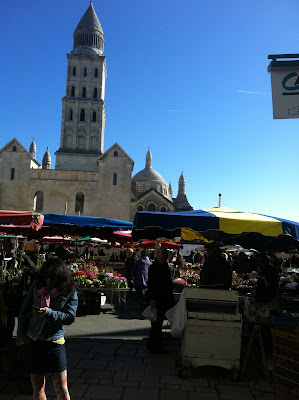On Saturday we finally made the time to visit the town of
Périgueux in the Périgord region. Périgord is our eastern border neighbour of
the Gironde and has a fascinating history, rich in cuisine and plentiful
dramatic landscapes.
Périgord is divided into four regions. To the east, cliffs
of Sarlat form Périgord Noir. The middle Isle Valley and the main town of
Périgueux where trade and industry have flourished is called Périgord Blanc. The
rolling hills and vineyards of Bergerac are in southern Périgord Pourpre and in
the north you have ‘Périgord Vert’ and its Parc Naturel Regional
Périgord-Limousin.
The region boasts some of the best-preserved prehistoric
sites including the fabulous cave paintings at Lascaux dating from the
Palaeolithic era. More recently it was a
major part of the Hundred Years’ War in the 14th and 15th
centuries. The region is littered with hundreds of medieval and Renaissance
Chateaux, some of the best to visit being Beynac, Bourdeilles and Puymartin.
When you arrive into Périgueux the town is dominated by the
magnificent domed white Cathedral of Saint Front: well worth a visit. The
religious site dates from the 11th century with the domes being
added in the 12th century. Viewed from the air, the four gigantic
domes form a cross.
On the other side of town is the Gallo Roman area, once
dominated by a huge amphitheatre. Built in the 1st century AD, the
structure once held 20,000 spectators.
What remains of the amphitheatre is
now found in the Jardin Arènes and since the scale of the ancient building can
be still seen, it’s worth having a look.
Saturday morning in Périgueux is a must as every square in
the historic town holds a food market. In Place de la Clautre, right under the
cathedral, you can find colourful local fruit and vegetables; Place de Coderc sells
fresh meat and poultry; in the Coderc Marché couvert you get great fresh fish and finally you’ll discover the
engulfing perfume of the truffle market in Place Saint Louis.
With the sites of Périgueux covered it was time to explore the
food and wine of this region! The narrow streets joining the various squares
together are bustling with cafes and bistros, with truffles in the air, and
duck and goose products everywhere you turn. We found a lovely small, family-run
restaurant called the Au Bien Bon. I recommend it, good traditional plates for
a 13€ menu midi accompanied by a pichet
of rustic vin rouge from Pécharment .
Although Bergerac wines are fairly well known, there are
some other little heard of wine appellations in Périgord. I tasted some
excellent AOC Pécharment in bottle and – albeit a bit rustic and tannic – some
good carafe red that goes well with a lunch of duck and pate.
Pécharment is a tiny 400ha vineyard area that lies in the
northern hills around the town of Bergerac. Red Bordeaux varietals are used here
and some good honest wines are made. Apparently the vineyards of Pécharment
used to be harvested to make the delicate white wines of Rosette. Rosette is an
AOC in its own right and is now limited to the west of Pécharment it is the
smallest and least known AOC of the region that uses Semillon, Sauvignon and
Muscadelle to produce wines that must contain between 8-54 g/l residual sugar. I
tried a 2012 Clos l’Envège which was delicate with light tropical
aromas, slightly sweet (15g/l) but with a good acidity and body. Great
alternative to sweet wine for either a pate starter or dessert; try one if you
can get one!
If you ever visit Périgueux then I recommend the following restaurants (reservation a must) and a bottle of Rosette can be found at the Cave Julien De Savignac in rue Taillefer.
·
Au Bien Bon 15 Rue des Places, Tel: 05 53 09 69 91
·
Le Grain du Sel Restaurant at 7 Rue des Farges
Tel: 05 53 53 45 22
·
Café de la Place, 7 Place du Marché au Bois 24000
Périgueux Tel: 05 53 08 21 11








No comments:
Post a Comment